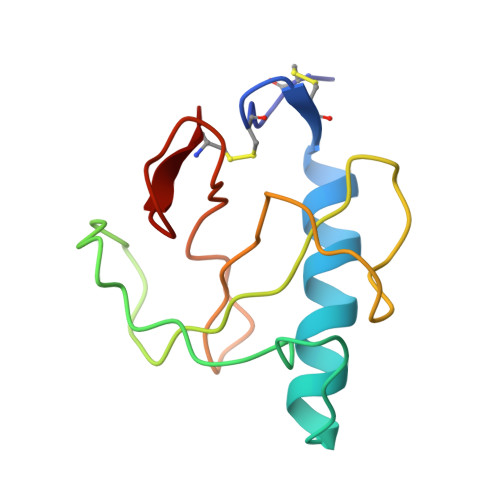Dissection of the structural and functional role of a conserved hydration site in RNase T1.
Langhorst, U., Loris, R., Denisov, V.P., Doumen, J., Roose, P., Maes, D., Halle, B., Steyaert, J.(1999) Protein Sci 8: 722-730
- PubMed: 10211818
- DOI: https://doi.org/10.1110/ps.8.4.722
- Primary Citation of Related Structures:
1BVI, 2HOH, 3HOH, 4HOH, 5HOH - PubMed Abstract:
The reoccurrence of water molecules in crystal structures of RNase T1 was investigated. Five waters were found to be invariant in RNase T1 as well as in six other related fungal RNases. The structural, dynamical, and functional characteristics of one of these conserved hydration sites (WAT1) were analyzed by protein engineering, X-ray crystallography, and (17)O and 2H nuclear magnetic relaxation dispersion (NMRD). The position of WAT1 and its surrounding hydrogen bond network are unaffected by deletions of two neighboring side chains. In the mutant Thr93Gln, the Gln93N epsilon2 nitrogen replaces WAT1 and participates in a similar hydrogen bond network involving Cys6, Asn9, Asp76, and Thr91. The ability of WAT1 to form four hydrogen bonds may explain why evolution has preserved a water molecule, rather than a side-chain atom, at the center of this intricate hydrogen bond network. Comparison of the (17)O NMRD profiles from wild-type and Thr93Gln RNase T1 yield a mean residence time of 7 ns at 27 degrees C and an orientational order parameter of 0.45. The effects of mutations around WAT1 on the kinetic parameters of RNase T1 are small but significant and probably relate to the dynamics of the active site.
Organizational Affiliation:
Dienst Ultrastructuur, Vlaams Interuniversitair instituut voor Biotechnologie, Vrije Universiteit Brussel, Belgium.


















